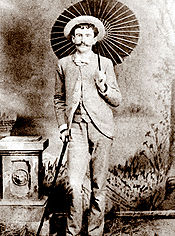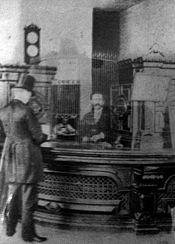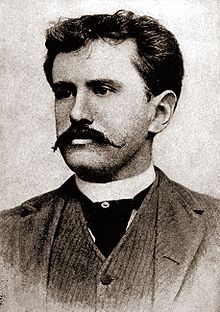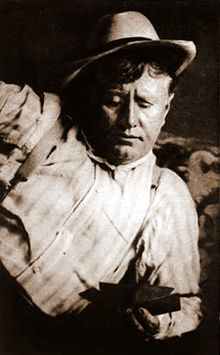- O. Henry
-
William Sydney Porter
"O. Henry"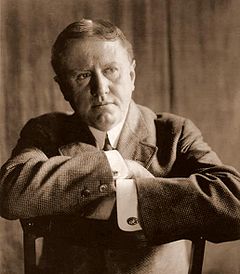
Born William Sidney Porter
September 11, 1862
Greensboro, North CarolinaDied June 5, 1910 (aged 47)
New York City, New YorkPen name O. Henry, Olivier Henry, Oliver Henry[1] Occupation Writer Nationality American O. Henry was the pen name of the American writer William Sydney Porter (September 11, 1862 – June 5, 1910). O. Henry's short stories are well known for their wit, wordplay, warm characterization and clever twist endings.
Contents
Life
Early life
William Sidney Porter was born on September 11, 1862, in Greensboro, North Carolina. His middle name at birth was Sidney; he changed the spelling to Sydney in 1898. His parents were Dr. Algernon Sidney Porter (1825–1888), a physician, and Mary Jane Virginia Swaim Porter (1833–1865). They were married April 20, 1858. When William was three, his mother died from tuberculosis, and he and his father moved into the home of his maternal grandmother. As a child, Porter was always reading, everything from classics to dime novels; his favorite works were Lane's translation of One Thousand and One Nights, and Burton's Anatomy of Melancholy.[2]
Porter graduated from his aunt Evelina Maria Porter's elementary school in 1876. He then enrolled at the Lindsey Street High School. His aunt continued to tutor him until he was fifteen. In 1879, he started working in his uncle's drugstore and in 1881, at the age of nineteen, he was licensed as a pharmacist. At the drugstore, he also showed off his natural artistic talents by sketching the townsfolk.
Move to Texas
Porter traveled with Dr. James K. Hall to Texas in March 1882, hoping that a change of air would help alleviate a persistent cough he had developed. He took up residence on the sheep ranch of Richard Hall, James' son, in La Salle County and helped out as a shepherd, ranch hand, cook and baby-sitter. While on the ranch, he learned bits of Spanish and German from the mix of immigrant ranch hands. He also spent time reading classic literature. Porter's health did improve and he traveled with Richard to Austin in 1884, where he decided to remain and was welcomed into the home of the Harrells, who were friends of Richard's. Porter took a number of different jobs over the next several years, first as pharmacist then as a draftsman, bank teller and journalist. He also began writing as a sideline.
Porter led an active social life in Austin, including membership in singing and drama groups. Porter was a good singer and musician. He played both the guitar and mandolin. He became a member of the "Hill City Quartet," a group of young men who sang at gatherings and serenaded young women of the town. Porter met and began courting Athol Estes, then seventeen years old and from a wealthy family. Her mother objected to the match because Athol was ill, suffering from tuberculosis. On July 1, 1887, Porter eloped with Athol to the home of Reverend R. K. Smoot, where they were married.
The couple continued to participate in musical and theater groups, and Athol encouraged her husband to pursue his writing. Athol gave birth to a son in 1888, who died hours after birth, and then a daughter, Margaret Worth Porter, in September 1889. Porter's friend Richard Hall became Texas Land Commissioner and offered Porter a job. Porter started as a draftsman at the Texas General Land Office (GLO) in 1887 at a salary of $100 a month, drawing maps from surveys and field notes. The salary was enough to support his family, but he continued his contributions to magazines and newspapers.
In the GLO building, he began developing characters and plots for such stories as "Georgia's Ruling" (1900), and "Buried Treasure" (1908). The castle-like building he worked in was even woven into some of his tales such as "Bexar Scrip No. 2692" (1894). His job at the GLO was a political appointment by Hall. Hall ran for governor in the election of 1890 but lost. Porter resigned in early 1891 when the new governor was sworn in. The same year, Porter began working at the First National Bank of Austin as a teller and bookkeeper at the same salary he had made at the GLO. The bank was operated informally and Porter had trouble keeping track of his books. In 1894, he was accused by the bank of embezzlement and lost his job but was not indicted. He now worked full time on his humorous weekly called The Rolling Stone, which he started while working at the bank. The Rolling Stone featured satire on life, people and politics and included Porter's short stories and sketches. Although eventually reaching a top circulation of 1500, The Rolling Stone failed in April 1895, perhaps because of Porter's poking fun at powerful people. Porter also may have ceased publication as the paper never provided the money he needed to support his family. By then, his writing and drawings caught the attention of the editor at the Houston Post.
Porter and his family moved to Houston in 1895, where he started writing for the Post. His salary was only $25 a month, but it rose steadily as his popularity increased. Porter gathered ideas for his column by loitering in hotel lobbies and observing and talking to people there. This was a technique he used throughout his writing career. While he was in Houston, the First National Bank of Austin was audited and the federal auditors found several discrepancies. They managed to get a federal indictment against Porter. Porter was subsequently arrested on charges of embezzlement, charges which he denied, in connection with his employment at the bank.
Flight and return
Porter's father-in-law posted bail to keep Porter out of jail, but the day before Porter was due to stand trial on July 7, 1896, he fled, first to New Orleans and later to Honduras. While holed up in a Trujillo hotel for several months, he wrote Cabbages and Kings, in which he coined the term "banana republic" to describe the country, subsequently used to describe almost any small, unstable tropical nation in Latin America.[3] Porter had sent Athol and Margaret back to Austin to live with Athol's parents. Unfortunately, Athol became too ill to meet Porter in Honduras as Porter had planned. When he learned that his wife was dying, Porter returned to Austin in February 1897 and surrendered to the court, pending an appeal. Once again, Porter's father-in-law posted bail so Porter could stay with Athol and Margaret.
Athol Estes Porter died on July 25, 1897, from tuberculosis (then known as consumption). Porter, having little to say in his own defense, was found guilty of embezzlement in February 1898, sentenced to five years jail, and imprisoned on March 25, 1898, as federal prisoner 30664 at the Ohio Penitentiary in Columbus, Ohio. While in prison, Porter, as a licensed pharmacist, worked in the prison hospital as the night druggist. Porter was given his own room in the hospital wing, and there is no record that he actually spent time in the cell block of the prison. He had fourteen stories published under various pseudonyms while he was in prison, but was becoming best known as "O. Henry", a pseudonym that first appeared over the story "Whistling Dick's Christmas Stocking" in the December 1899 issue of McClure's Magazine. A friend of his in New Orleans would forward his stories to publishers, so they had no idea the writer was imprisoned. Porter was released on July 24, 1901, for good behavior after serving three years. Porter reunited with his daughter Margaret, now age 11, in Pittsburgh, Pennsylvania, where Athol's parents had moved after Porter's conviction. Margaret was never told that her father had been in prison—just that he had been away on business.
Later life
Porter's most prolific writing period started in 1902, when he moved to New York City to be near his publishers. While there, he wrote 381 short stories. He wrote a story a week for over a year for the New York World Sunday Magazine. His wit, characterization and plot twists were adored by his readers, but often panned by critics. Porter married again in 1907, to childhood sweetheart Sarah (Sallie) Lindsey Coleman, whom he met again after revisiting his native state of North Carolina. However, despite the success of his short stories being published in magazines and collections (or perhaps because of the attendant pressure that success brought), Porter drank heavily.
His health began to deteriorate in 1908, which affected his writing. Sarah left him in 1909, and Porter died on June 5, 1910, of cirrhosis of the liver, complications of diabetes and an enlarged heart. After funeral services in New York City, he was buried in the Riverside Cemetery in Asheville, North Carolina. His daughter, Margaret Worth Porter, died in 1927 and was buried with her father.
Stories
O. Henry's stories are famous for their surprise endings, to the point that such an ending is often referred to as an "O. Henry ending." He was called the American answer to Guy de Maupassant. Both authors wrote twist endings, but O. Henry stories were much more playful. His stories are also well known for witty narration. Most of O. Henry's stories are set in his own time, the early years of the 20th century. Many take place in New York City and deal for the most part with ordinary people: clerks, policemen, waitresses.
O. Henry's work is wide-ranging, and his characters can be found roaming the cattle-lands of Texas, exploring the art of the "gentle grafter," or investigating the tensions of class and wealth in turn-of-the-century New York. O. Henry had an inimitable hand for isolating some element of society and describing it with an incredible economy and grace of language. Some of his best and least-known work resides in the collection Cabbages and Kings, a series of stories which each explore some individual aspect of life in a paralytically sleepy Central American town while each advancing some aspect of the larger plot and relating back one to another in a complex structure which slowly explicates its own background. O.Henry's work is fundamentally a product of his time, and contains examples of casual racism.
Cabbages and Kings was his first collection of stories, followed by The Four Million. The second collection opens with a reference to Ward McAllister's "assertion that there were only 'Four Hundred' people in New York City who were really worth noticing. But a wiser man has arisen—the census taker—and his larger estimate of human interest has been preferred in marking out the field of these little stories of the 'Four Million.'" To O. Henry, everyone in New York counted. He had an obvious affection for the city, which he called "Bagdad-on-the-Subway,"[4] and many of his stories are set there—but others are set in small towns and in other cities.
Among his most famous stories are:
- "The Gift of the Magi" about a young couple who are short of money but desperately want to buy each other Christmas gifts. Unbeknownst to Jim, Della sells her most valuable possession, her beautiful hair, in order to buy a platinum fob chain for Jim's watch; while unbeknownst to Della, Jim sells his own most valuable possession, his watch, to buy jeweled combs for Della's hair. The essential premise of this story has been copied, re-worked, parodied, and otherwise re-told countless times in the century since it was written.
- "The Ransom of Red Chief", in which two men kidnap a boy of ten. The boy turns out to be so bratty and obnoxious that the desperate men ultimately pay the boy's father $250 to take him back.
- "The Cop and the Anthem" about a New York City hobo named Soapy, who sets out to get arrested so he can avoid sleeping in the cold winter as a guest of the city jail. Despite efforts at petty theft, vandalism, disorderly conduct, and "mashing" with a young prostitute, Soapy fails to draw the attention of the police. Disconsolate, he pauses in front of a church, where an organ anthem inspires him to clean up his life — and is ironically charged for loitering and sentenced to three months in prison.
- "A Retrieved Reformation", which tells the tale of safecracker Jimmy Valentine, recently freed from prison. He goes to a town bank to case it before he robs it. As he walks to the door, he catches the eye of the banker's beautiful daughter. They immediately fall in love and Valentine decides to give up his criminal career. He moves into the town, taking up the identity of Ralph Spencer, a shoemaker. Just as he is about to leave to deliver his specialized tools to an old associate, a lawman who recognizes him arrives at the bank. Jimmy and his fiancée and her family are at the bank, inspecting a new safe, when a child accidentally gets locked inside the airtight vault. Knowing it will seal his fate, Valentine opens the safe to rescue the child. However, much to Valentine's surprise, the lawman denies recognizing him and lets him go.
Pen name
Porter gave various explanations for the origin of his pen name.[5] In 1909 he gave an interview to The New York Times, in which he gave an account of it:
It was during these New Orleans days that I adopted my pen name of O. Henry. I said to a friend: "I'm going to send out some stuff. I don't know if it amounts to much, so I want to get a literary alias. Help me pick out a good one." He suggested that we get a newspaper and pick a name from the first list of notables that we found in it. In the society columns we found the account of a fashionable ball. "Here we have our notables," said he. We looked down the list and my eye lighted on the name Henry, "That'll do for a last name," said I. "Now for a first name. I want something short. None of your three-syllable names for me." "Why don’t you use a plain initial letter, then?" asked my friend. "Good," said I, "O is about the easiest letter written, and O it is."
A newspaper once wrote and asked me what the O stands for. I replied, "O stands for Olivier, the French for Oliver." And several of my stories accordingly appeared in that paper under the name Olivier Henry.[6]
In the introduction to The World of O. Henry: Roads of Destiny and Other Stories (Hodder & Stoughton, 1973), William Trevor writes that when Porter was in the Ohio State Penitentiary "there was a prison guard named Orrin Henry, whom William Sydney Porter . . . immortalised as O. Henry".
The writer and scholar Guy Davenport offers another explanation: "[T]he pseudonym that he began to write under in prison is constructed from the first two letters of Ohio and the second and last two of penitentiary [bold added]."[5]
Legacy
The O. Henry Award is a prestigious annual prize named after Porter and given to outstanding short stories. Several schools around the country bear Porter's pseudonym.
In 1952, a film featuring five stories, called O. Henry's Full House, was made. The episode garnering the most critical acclaim[citation needed] was "The Cop and the Anthem" starring Charles Laughton and Marilyn Monroe. The other stories are "The Clarion Call", "The Last Leaf", "The Ransom of Red Chief" (starring Fred Allen and Oscar Levant), and "The Gift of the Magi".
The O. Henry House and O. Henry Hall, both in Austin, Texas, are named for him. O. Henry Hall, now owned by the University of Texas, previously served as the federal courthouse in which O. Henry was convicted of embezzlement.
Porter has elementary schools named for him in Greensboro, North Carolina (William Sydney Porter Elementary[7]) and Garland, Texas (O. Henry Elementary), as well as a middle school in Austin, Texas (O. Henry Middle School[8]). The O. Henry Hotel in Greensboro is also named for Porter.
See also
Notes
- ^ "The Marquis and Miss Sally", Everybody's Magazine, vol 8, issue 6, June 1903, appeared under the byline "Oliver Henry"
- ^
 "Henry, O.". Encyclopædia Britannica (12th ed.). 1922.
"Henry, O.". Encyclopædia Britannica (12th ed.). 1922. - ^ Malcolm D. MacLean, "O. Henry in Honduras," American Literary Realism, 1870-1910 1/3 (1968): 36-46.
- ^ Henry, O. "A Madison Square Arabian Night," from The Trimmed Lamp: "Oh, I know what to do when I see victuals coming toward me in little old Bagdad-on-the-Subway. I strike the asphalt three times with my forehead and get ready to spiel yarns for my supper. I claim descent from the late Tommy Tucker, who was forced to hand out vocal harmony for his pre-digested wheaterina and spoopju." The Trimmed Lamp, Project Gutenberg text
- ^ a b Guy Davenport, The Hunter Gracchus and Other Papers on Literature and Art, Washington, D.C.: Counterpoint, 1996.
- ^ "'O. Henry' on Himself, Life, and Other Things" (PDF), New York Times, Apr. 4, 1909, p. SM9.
- ^ Arnett, Ethel Stephens (1973). For Whom Our Public Schools Were Named, Greensboro, North Carolina. Piedmont Press. pp. 245.
- ^ O. Henry Middle School, Austin, TX.
Further reading
- Smith, C. Alphonso (November 1916). "The Strange Case Of Sydney Porter And "O. Henry"". The World's Work: A History of Our Time XXXIII: 54–64. http://books.google.com/?id=lPAMVa7esS4C&pg=PA54. Retrieved 2009-08-04.
External links
Categories:- American short story writers
- Deaths from cirrhosis
- Writers from North Carolina
- People from Greensboro, North Carolina
- Prison writings
- 1862 births
- 1910 deaths
- Alcohol-related deaths in New York
- American pharmacists
- Pseudonymous writers
Wikimedia Foundation. 2010.

